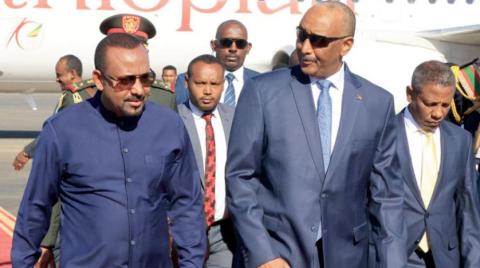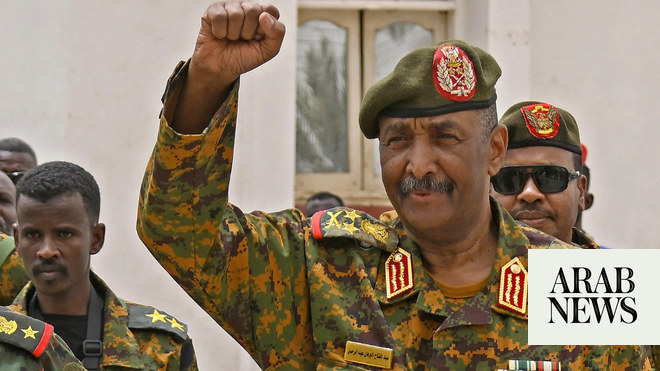
Ethiopian Prime Minister Abiy Ahmed informed the Sudanese parties that he does not bring any new initiatives or proposals on the political situation in Sudan.
The Prime Minister indicated that the government strongly supports the framework political agreement signed between the Sudanese parties and rejects any external interference.
Ahmed stressed that the Grand Ethiopian Renaissance Dam (GERD) would not cause any harm to Sudan and that the two parties agreed on resolving border disputes through negotiation.
Ahmed arrived in Khartoum on a one-day visit and met with the Chairman of the Sovereign Council, Abdel Fattah al-Burhan.
The foreign ministers of both countries issued a joint statement indicating that the visit aims to show solidarity and support with the government and people of Sudan, hoping for an intra-Sudanese consensus that leads to the stability of the transitional period, achieving democratic transformation, and strengthening ties between the two nations.
The Ethiopian side stressed that the Sudanese people could solve their problems to form a civilian government and other transitional institutions.
The statement indicated that Ahmed held talks with the Sudanese parties that signed and did not sign the framework agreement, urging them to resolve their differences and work together to achieve peace and stability.
The statement noted that the Sudanese side welcomed the Ethiopian peace agreement concluded in Pretoria, South Africa, last November between the Ethiopian government and the Tigray's People Liberation Front.
The agreement was an important step that promotes stability and peace and ends the war in Ethiopia, which will positively affect Sudan, said the statement.
The two countries also agreed to address bilateral issues through dialogue and understanding, including on GERD, based on the mechanisms between the two countries.
After the summit with Ahmed, Burhan announced that the two countries agreed on all outstanding issues relating to the dam.
Sovereign Council-affiliated media reported in a statement obtained by Asharq Al-Awsat that the meeting addressed bilateral relations and ways to strengthen joint coordination mechanisms between the two countries.
The statement noted that Burhan said the two countries reached an agreement on all GERD issues, adopting dialogue, documents, and technical mechanisms as an essential reference for resolving border issues.
After he met with Burhan, Ahmed met the Vice President of the Sovereign Council, Mohammad Hamdan Dagalo, known as Hemedti, and discussed bilateral relations and the current regional and local political developments.
Hemedti confirmed that the two countries would increase their cooperation and strengthen economic, trade, and investment relations in the interest of Sudan, Ethiopia, and regional governments.
According to the statement, Hemedti gave the Ethiopian Prime Minister a detailed explanation of the current political developments in the country in light of the framework agreement.
Hemedti asserted that they were committed to implementing the agreement and cooperating with the parties to resolve the political crisis and complete the transitional period.
Ahmed said his country supports the Sudanese efforts to resolve the political crisis and urged all parties to cooperate and prioritize the national interest to achieve stability in the country.
Later, Ahmed met with various Sudanese political parties, including a delegation from the opposition coalition Forces of Freedom and Change. The meeting was chaired by the head of the National Umma Party (NUP), Fadlallah Burma Nasir.
The commander of the Forces of Freedom and Change, al-Wathiq al-Berair, said in press statements that they discussed the importance of supporting the intra-Sudanese dialogue without external interference.
He asserted their support for the current political process.
The Freedom and Change sources told Asharq Al-Awsat that the Ethiopian Prime Minister informed them of his full support for the political framework agreement and said that he did not come to present any solutions or proposals regarding the current political process in Sudan.
Ahmed asserted that Ethiopia would stand firmly against any party that tried to obstruct the political solution led by the Sudanese.
Berair explained that Ahmed urged reaching a final agreement between the Sudanese political parties and promised to support it strongly if it was signed.
Ahmed's visit ended a prolonged rift between the two countries, which resulted from border military skirmishes between the armies over the Sudanese al-Fashaga region.
Ahmed enjoys remarkable popular and official support in Sudan, based on his role during the Sudanese revolution.
In early January, the signatory parties to the framework agreement began the final phase of the political process by discussing and resolving several key issues before signing the final deal and starting a new transitional period in the country.
On Dec. 5, Sudanese army leaders, the Freedom and Change, and other parties supporting the transition signed a framework agreement paving the way for the army's return to barracks and forming a full civil transition authority.










